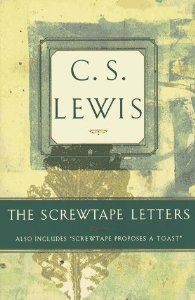I just completed reading C.S. Lewis’ The Screwtape Letters. The book is divided into several letters from a senior devil, Screwtape, to a junior devil, Wormwood, who is working on bringing a man’s soul under the influence of Satan. Each letter investigates a tactic that Satan’s minions use in order to move us away from God, who is referred to as the Enemy throughout the book. Screwtape instructs his apprentice on how to manipulate human attitudes towards prayer, love, lust, war, politics, the Church, ambitions, etc. in very subtle ways so that someone’s soul will be on the path towards Hell without even realizing it.
The Screwtape Letters does a great job of taking some complex moral and ethical questions and discussing them in simple terms. Because of the “us vs. them” format of the book you almost feel like you are reading Satan’s playbook on how to tempt you into sin. While most of the time we learn about how we should live, it is equally useful to learn how NOT to live. In other words, understanding Satan’s tricks and lies are sometimes just as important as knowing God’s love. And C.S. Lewis makes it so easy to understand the nature of evil due to the casual nature of the book being in the form of personal letters. Screwtape’s candor does not hold back the evil intent behind his various tactics.
This book is not heavy in terms of exploring deep theological arguments in Catholic doctrine. After all, C.S. Lewis was more of “buffet style” Christian where he picked and chose elements from different denominations scattered with some of his own personal beliefs. So he leaves the deep discussion of doctrine and theological arguments to St. Thomas Aquinas and other doctors of the Church. Instead, Lewis provides a good introduction and a more light-hearted discussion on the nature of evil for those of us who do not hold a Ph.D in theology.
Personally, I felt that the book got a little stale towards the end once the novelty of learning about morality from the other side wore off. It sort of felt like Screwtape starts to repeat himself in later letters as he brings up the same themes but uses different examples. Even in the postscript, C.S. Lewis admits that this was one of the least enjoyable books he wrote because the ideas just came so easily to him. He admitted that he feared he would smother the readers if he wrote a longer book. Regardless, it is an interesting read and would suggest that everyone gives it a try. I can also see it making a great gift for those who need a little theological refresher but do not want to dive into more serious texts.
Related articles
- Screwtape on Pleasure (insidecatholic.com)
- C. S. Lewis’s Classic Look at Liar’s Work (opinariwriters.blogspot.com)
- Hugh Hewitt: Reading Lewis (hughhewitt.com)



Great review! I am interested in reading it.